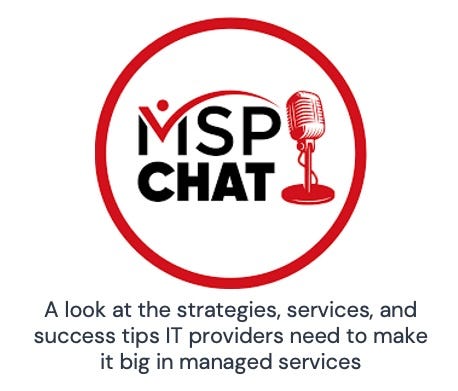Move Over, Private Equity. Venture Capital is Investing in MSPs Too.
General Catalyst’s $74 million bet on “AI rollup” Titan is part of a growing trend. Plus: MCP for Autotask but not from Kaseya and why MSPs should fear the AI consultant threat.
No two ways about it. AI remains the biggest thing going in venture capital right now.
Indeed, AI startups accounted for 53% of all VC investment globally in the first half of the year, according to Pitchbook, and 64% here in the U.S.
Most of those funds went in nine-digit hunks to companies like Runway, which makes AI video generation software for Hollywood movie studios, or in ten-digit hunks to companies like OpenAI co-founder Ilya Sutskever’s Safe Superintelligence, which makes … something. But some of it flowed to startups looking to find “companies that were traditionally service and labour companies and transform them with AI.”
That’s straight from the lips of Hemant Taneja, CEO of General Catalyst, a Silicon Valley VC heavyweight with some $40 billion of assets under management including stakes in Anthropic and Mistral AI that’s also investing in “AI roll-ups” designed to turn good little service providers into great big service providers through the power of AI-enabled automation. Not just any good little service providers, however. General Catalyst has a particular target in mind:
“Let’s start with the idea that AI is a transformative force and the value really accrues to companies that have existing customers and data,” Taneja says, meaning a solid book of business and plenty of raw material for LLMs to feed on. Within that cohort, he continues, businesses outsourcing tasks like running a call center overseas “because of labour arbitrage” are especially low-hanging fruit.
Sound like anyone you know? A well-run MSP has a loyal, established customer base, unusually large volumes of data (as AI startup founder Lee Silverstone realized once upon a time), and quite possibly an offshore help desk team.
Which is why earlier this year General Catalyst led a $74 million funding round in Titan, an ambitious young AI rollup for MSPs staffed by veterans of Google and Vanta, among others, and founded by a duo with experience at companies like Scale AI, Snap, and Waymo. Those earlier roles, spent building at the intersection of AI and operations, left both men convinced there was a great deal of money to be made doing the same thing somewhere in the service sector.
“We were just looking for industries where we thought AI was going to make a massive impact and redefine the way that work was done,” says David Heffernan (pictured left).
Their search led them to managed services and an investment thesis that drew the interest not only of General Catalyst but of former ConnectWise CEO and current Cynet CEO Jason Magee, who’s also a Titan advisor.
“We go out, find the best IT service firms and MSPs in particular to partner with, and then scale the organization through our augmented AI platform,” explains Saurin Patel (pictured right).
It really is their AI platform too. Titan’s service desk automation stack was developed in-house by the kind of people who helped create the commercial LLMs it runs on. According to Patel, the system’s semi-autonomous agents can close tickets that might take a human tech half an hour in a few minutes.
“It’s a win-win all around,” he says. “Customers are getting better, faster, and more efficient service. The MSPs that we go out and partner with are actually leveled up to do more interesting work and be more consultative in nature to their clients.”
That’s exactly what those MSPs are looking to do, according to Heffernan. “A lot of them see the writing on the wall that AI is going to transform the space,” he says. “The chance to partner up with the leading AI MSP player is a pretty compelling value prop.”
Titan’s sole acquisition to date in its very brief history, New York-based IT services provider RFA, has a couple hundred customers and about 250 employees, but size doesn’t define what the company looks for when shopping.
“We want an MSP that has a really good brand and reputation with its customers but maybe is doing things more manually today than if they had more streamlined operations and augmented AI to accelerate a lot of their workflows,” Heffernan says. To find them, Titan inspects more than just the company’s balance sheet.
“We’re getting very deep down to even ticket-level data to understand what the actual work is happening at the MSP today and if it is in line with where our current automation sits and where our automation roadmap is going,” Patel says, noting that MSPs with happy customers and inefficient service desks are where the greatest potential for AI-powered value creation lies.
Service desks aren’t all Titan wants to automate, though. The company plans to add a whole new set of as yet unwritten sales and marketing technologies in areas like quoting, proposal writing, and content generation in a bid to help MSPs grow the top line as well as the bottom one.
“I do think getting growth right for us is quite an important element,” Patel says.
That’s arguably an understatement given Titan’s goal to create the first Accenture or Cognizant for the SMB channel. “Our ambitions are pretty large,” Patel says. “We think it’s a really interesting opportunity to build the next $100 billion company out there in the IT services space.”
DarcyIQ beats Kaseya to the MCP for Autotask punch
Speaking of AI for MSPs, hat tip to Dave Sobel and the indispensable Business of Tech podcast for calling my attention to a recently announced MCP-based chatbot interface for Kaseya’s Autotask PSA from DarcyIQ.
Channelholic regulars will appreciate immediately why that story grabbed my interest: 1) I’ve been writing a whole lot in recent weeks about the potentially transformational impact of MCP interfaces on RMM and PSA solutions, and 2) one of those stories discussed an MCP interface coming from Kaseya itself. Is DarcyIQ collaborating with Kaseya on MCP? Competing with it?
Keep reading for an answer to both questions. First, let’s discuss DarcyIQ, because it’s a sign of the times for AI in MSP software in several different ways.
To begin, DarcyIQ isn’t a company strictly speaking so much as an AI-powered platform from Darcy, a business unit of top-tier AWS service partner Innovative Solutions with origins stretching back 18 months or so ago to a marketing campaign that resulted in what most solution providers would agree is a nice problem to have.
“We had an influx of leads, and we could not for the life of us keep up with it,” recalls Travis Rehl (pictured), Innovative’s CTO.
That left the company with three choices: hire more salespeople, leave some of its leads unpursued for weeks, or drop a portion of those potential deals altogether.
“Honestly, we hated all three options,” Rehl says, “so we made a fourth, and that evolved into what we call Darcy.”
Coded from scratch by Innovative using four separate AWS Bedrock LLMs, the system is designed to help MSPs and other service providers find, qualify, and nurture leads automatically before rapidly turning them into sales prospects.
“Our team can meet a customer, we can engage with them and learn about their desires as a business, we can devise a proposal in PowerPoint in their format, and hand it right back to the customer in under an hour,” Rehl says. That’s about 70% less time, Innovative estimates, than you’d need using traditional methods.
Darcy provides live AI assistance during sales calls too by doing things like generate meeting summaries on the fly in near real time. Functionality vaguely reminiscent of what fellow AI-native startup Cyft is building silently listens to calls, anticipates questions the prospect is about to ask, and suggests answers within about two seconds.
“It’s wicked fast,” Rehl says. “If a customer asks a question, usually before they’re even done speaking, Darcy probably has come up with additional information.” The system proposes questions for you to ask as well to keep the conversation moving toward a sale.
Make the sale, of course, and you now have to process tickets, create documentation, manage projects, and more for the customer inside your PSA solution. All of that would be much simpler, Rehl and team mused, with automated assistance from Darcy, so they began drawing up plans to integrate the system via MCP with the PSA solution Innovative itself uses, Autotask. They quickly encountered a roadblock, however.
“We went looking, and Kaseya didn’t have an MCP server,” Rehl says. “So we ended up just building one for them.”
Using it and its chatbot front end, technicians can query and control Autotask with natural language prompting. Agentic capabilities let MSPs perform a variety of complex tasks automatically too.
“We’re an Amazon partner, and Darcy is literally looking into an Amazon account to find what the customer is building, deploying, and changing, pulling that information out, finding the gaps that we should suggest back to the customer, and writing those gaps as tickets right back into Autotask,” Rehl says.
Kaseya is neither collaborating with Innovative on DarcyIQ nor standing in its way. Executives at the company right up to CEO Rania Succar have spoken supportively with the company, which has no intention of souring that relationship down the road.
“Our hope and dream is that eventually they will have their own Autotask MCP, among others, and we can retire ours and use theirs,” Rehl says.
In the meantime, DarcyIQ and products like it from Cyft, zofiQ (which has a brand new client insights agent), and others are bearing out something N-able’s chief technology and product officer said back in May: it’s really hard for end-to-end managed services platform providers to move as fast in AI as nimble young startups. Kaseya expects to launch an MCP interface next year some time. Innovative converted a system originally meant for internal use into a market-ready, generally available product in just nine months.
“We didn’t want to wait until 2026,” Rehl says.
AI consultants are coming for your clients, MSPs
Per an earlier post, I spent part of a long flight home to Seattle not long ago reading a recently published book by Art Gross, CEO of Breach Secure Now, called From Prompt to Profit: The MSP Playbook for AI-Driven Client Success. There’s a lot to like in it, but one chapter in particular grabbed my attention. Called “The AI Consultant Threat (And Why MSPs Must Lead),” it warns MSPs of a rapidly mounting danger hiding from most of them in plain sight.
“Right now, there are consultants popping up everywhere who know how to build GPT agents, have experience creating automations and workflows, know how to navigate business operations and change management, and are positioning themselves as the experts on AI strategy,” Gross (pictured) writes.
Who are these people, I wondered, and what led Gross to devote a hunk of his book to them?
His answer, shared during an interview for the podcast I co-host, required a trip back in time to 2009, when the federal government’s HITECH Act budgeted billions of dollars to subsidize adoption of electronic health record solutions. All of a sudden, self-declared specialists lured by that money began selling EHR services to clients Gross supported via Entegration Inc., the healthcare MSP he continues to lead as president and CEO. Worse than watching an interloper make off with revenue that should have been his was watching his trusted advisor status with customers melt away beneath his feet.
“I went from being strategic to that tech company that just implements someone else’s strategy,” Gross recalls.
Now he’s watching a new crop of consultants run the same playbook in pursuit of the $307 billion businesses worldwide will spend on AI solutions this year alone, according to IDC.
“It’s a gold rush,” Gross says.
The organizations pursuing it, he continues, aren’t MSPs or solution providers. Many of them aren’t even technology companies, which is why so many IT providers don’t know they’re out there. But they are without question out there. Run a search on “AI consulting” plus your zip code and the results will almost certainly include businesses you’ve never heard of offering AI automation assistance to clients like yours. They often know little about AI, according to Gross, but a lot about sales.
“They’re going straight to management with promises of ROI and efficiencies,” he says, adding that it’s a problem in ways extending beyond lost revenue.
“All of a sudden, they’re the ones dictating the technology that MSPs potentially have to support,” he says. Worse yet, they’re connecting that technology to your customers’ data. “That could cause some security concerns,” Gross notes.
If it does, you’ll have no one to blame but yourself if you don’t yet provide AI services of your own, he continues. His book outlines a 90-day plan for filling that void that includes conducting “AI risk assessments,” delivering AI awareness training, and developing industry-specific AI policy templates.
“Get ahead of the AI consultants,” Gross advises. And if you still can’t beat them, he adds, consider joining them instead.
“Not all consultants are bad,” Gross says. “A lot of MSPs don’t have [AI] capabilities, so give yourself time to start to build that internal understanding and knowledge and potentially start to build it yourself, but maybe in the beginning, partner with other vendors to help you.”
Want more of Art Gross’s thoughts on AI for MSPs?
Reading Gross’s book is a good way to get them. Listening to the interview he did with me recently for an episode of MSP Chat, the podcast I co-host, is another. That episode airs September 19th, but there’s plenty of good stuff to hold you until then, including interviews recorded in the past few weeks with Kaseya CEO Rania Succar, Canalys analyst Jay McBain, and venture capital investors Joel Abramson and Mark Scott. Check it out here.
Two more things worth flagging
1. This looks like fun: Word arrived this week from FindMyITPartner.com’s Johnathan Schofield of a contest that looks like it could be as entertaining to watch as to be a part of. Called the MSP Cyber Melee, it will give entrants a shot at answering three security-related questions, online and at their own pace. Make it past that round and you’re qualified for the “live melee” (date and time TBA), during which contestants will take on seven cyber challenges for a chance to win a $1,000 Amazon gift card.
It's that second round that sounds entertaining, albeit stressful for the finalists, who will be tackling security problems in real time as more or less everyone they know watches online. Better yet, their efforts will be graded in real time by a pretty impressive panel of judges: Matt Lee, senior director of security and compliance at Pax8, ConnectWise security evangelist Matt Topper, Kyle Spooner, director of product analysis at NinjaOne, and Martin White, founder and CTO of TechIDManager, the company responsible for the contest.
Free to enter, and you can sign up now. They’ll schedule the live melee as soon as at least 25 people have completed the qualifying round. I’ll have popcorn at the ready.
2. My Channel Mastered colleague Howard M. Cohen has launched a new blog dedicated to helping MSPs explore “practical AI,” as in stuff you can do with artificial intelligence to get other stuff done for customers. Called The Agentic MSP, it’s totally free and available here. Give it a read.
Also worth noting
N-able (with help from HaloPSA, Auvik Networks, SecurityBiaS, and ScalePad) has launched CAT-Mip, a new solution designed to ease AI integrations across apps by standardizing the terminology they use.
HaloPSA’s new “$1M Forever” Enterprise Package offers very large organizations guaranteed $1 million ACV pricing until the end of time.
At the other end of the cost and customer spectrum, MSP360 has introduced a free Community Edition of its RMM platform for MSPs with up to 50 endpoints under management.
ZofiQ has launched Insights Agent, an automated weekly report for MSPs that analyzes ticket data for hidden risk and operational trends.
Devicie, covered here before, now offers its Microsoft Intune automation and deployment solutions on the Pax8 Marketplace.
Gradient MSP CEO Colin Knox is now also CEO of MSPCentric, a new vendor promising to integrate any product with popular PSA platforms for billing, ticketing, and more with just two API calls.
Egnyte has introduced AI agents for the architecture, engineering, and construction sector that automate time-consuming tasks like extracting details from large spec files.
Barracuda has added automated threat response for Microsoft Defender for Endpoint and Google Workspace to its managed XDR service.
Cynomi’s vCISO platform has a new third-party risk management module designed to streamline vendor risk assessments.
Version 3.6 of Coro’s security platform includes new AI-powered capabilities, centralized global policy management, advanced ZTNA, MFA, and more.
ThreatDown users can now purchase, provision, and bill security services through the Syncro marketplace.
SentinelOne has acquired Observo AI to add AI-native telemetry pipeline management to its SIEM and data offerings.
If you’re an Amazon Business Prime Essentials, Small, Medium, or Enterprise member, you now have free access to CrowdStrike’s Falcon Go solution.
Exabeam has integrated its security ops platform with Google Agentspace and Google Cloud’s Model Armor.
SailPoint has added new hands-on labs, training offerings, certifications, and more to its Identity University learning platform.
Cellhub and Lifetime EPR have introduced a PC-as-a-Service subscription offering Lenovo ThinkPads, bundled 5G connectivity, Microsoft 365, always-on support, and fixed 36-month pricing.
LogicalisOne, from Logicalis US, is a co-managed IT offering a mix of services to IT teams tailored to their business and consumption needs.
Registration for the next cohort of veterans to receive no-cost, generative AI training, and certification from Google is now open.
Mindmatrix and INFUSE are partnering to integrate AI-driven demand generation with modular channel marketing automation.
Anthony Anzevino is the new CRO at Kaseya. Pratik Wadher is the new CTO. See you both soon at DattoCon, gentlemen,
Corey Whiting is the new (first?) chief artificial intelligence officer at Procure IT.







